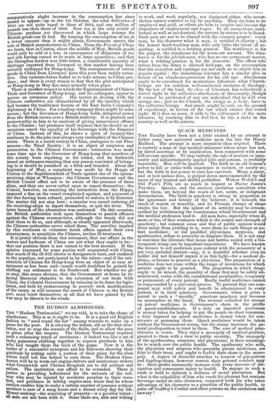QUACK MEDICINES.
THE Faculty have been not a little excited by an attempt to father some new universal medicine upon the late Sir Henry Halford. The attempt is more impudent than original. There is scarcely a man of any medical eminence whose name has not, by direct assertion or by implication, been connected with some kill-or-cure specific. To stop entirely the sale of noxious or igno- rantly and indiscriminately applied pills and potions, is probably impossible. Men will be quacked. The faith in an old woman's power to kill or strike with impotence is extinct, or nearly so ; but the faith in her power to cure has survived. Many a nasty, and at best useless dose, is gulped down unrecommended by the name of any learned and skilful godfather. Widow Welch's and Old Parr's Pills are as much in request as Doctor James's Powders. Quacks, and the anxious credulous consulters who make them, are beyond the reach of law, satire, or indignant denunciation. The faith in quackery is strong in proportion to
i
the ignorance and fatuity of the believer; it is beneath the reach of reason or morality, and its Protean change of shape eludes the law. But the sphere of its activity may be circum- scribed by withdrawing the countenance which Government and the medical profession lend it. All men have, especially when ill, more or less of that weakness which is the source and strength of quackery ; but common sense and fear of public opinion would deter many from yielding to it, were there no such things as pa- tent medicines ; or did qualified physicians, surgeons, and apothecaries, refuse to prescribe or dispense them. It is not easy to convince the illiterate that boxes and bottles sealed with a Go- vernment stamp can be impudent impositions. We have known the licence to sell medicines pass current with the peasantry of a not very secluded district—nay, it is doubtful whether even its holder did not himself regard it in this light—for a medical di- ploma, or licence to practise as a physician. The preparation of a medicine does not come within the range of inventions for which patents ought to be granted. The proportion in which drugs ought to be mixed, the quantity of them that may be safely ad- ministered, varies with the constitutional peculiarities, temporary or permanent, of every patient. Really useful medicines cannot be compounded by a universal process. To pretend that one com- pound may with safety and benefit be administered to every patient, is in itself quackery. Government, when it gives a patent to such a " specific," sanctions quackery and becomes an accomplice in the fraud. The revenue collected for stamps on patent medicines is Government's share in the profits of quack-establishments. If a duty on imported provisions is money taken for helping to put the people on short commons, a duty imposed on quack medicines is money taken for con- nivance at poisoning them. Quack medicines would be taken without the Government stamp, but the stamp increases the ge- neral predisposition to trust in them. The case of medical prac- titioners is worse. They enjoy a monopoly of medical practice, granted to them with a view to public security. The monopoly of the apothecaries, surgeons, and physicians, is their retaining- fee to watch over the public health. The apothecary who sells, the physician and surgeon who prescribe patent medicines, are false to their trust, and ought to forfeit their share in the mono- poly. A degree of discredit attaches to keepers of gin-palaces and tippling-shops, however correct their general conduct may be : their profits necessarily increase with every increase of dis- sipation and consequent injury to health. To engage in such a trade is held to indicate a dullness of moral perception. But what is the culpability of him who vends his pleasant but noxious beverage under its true character, compared with his who takes advantage of his character as a guardian of the public health, to palm off Godfrey's Cordial and other poisons on the credulous and unwary ?


























 Previous page
Previous page